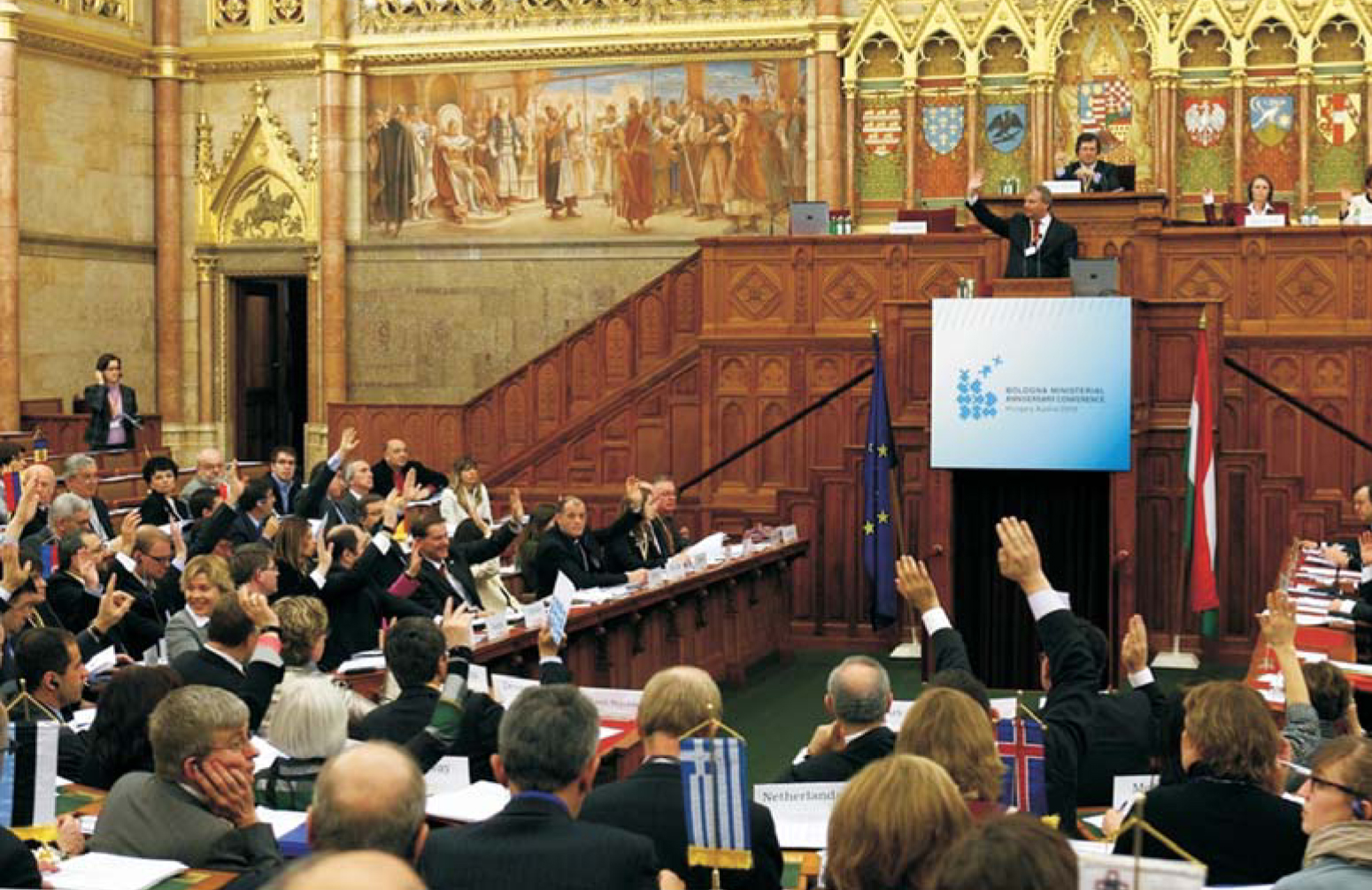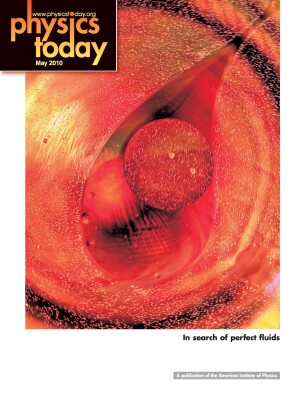Europe reflects on a decade of higher education reforms
DOI: 10.1063/1.3431323
“Who would have thought, 10 years ago, that the countries of Europe could start a process of changing their higher education systems? And that they would do it without any laws, without any overt leverage? To have achieved anything would have been significant,” says Tim Birtwistle, an emeritus law professor at the UK’s Leeds Metropolitan University. Not only have the political goals of the so-called Bologna Process been achieved, but a plethora of national reforms and a grass-roots response by the academic community are under way. Noting that most participating countries now use the bachelor’s, master’s, PhD sequence or a similar degree system, and that “learning has become more important than teaching,” Birtwistle, one of the UK’s designated “Bologna experts,” says that “a lot has been achieved, even while much remains to be done.”
At the 10th-anniversary celebration of the Bologna Process, held this past March in Budapest and Vienna, education ministers tipped their hats by launching the European Higher Education Area. The Bologna Process’s overarching goals, for which the EHEA is both an umbrella and a symbol, are transparency and recognition of degrees from one institution by another; comparability and compatibility of courses and degrees among universities; and increased mobility—facilitating students spending time at other institutions during a degree and switching institutions and fields for successive degrees. The Bologna Process, named for the Italian city where it was officially proposed in 1999, originally included 29 countries (see Physics Today, May 2001, page 21
The Bologna Process is epochal for the whole of Europe, says Luigi F. Donà dalle Rose, a physicist at the University of Padua and one of Italy’s Bologna experts—people paid by the European Commission to stay abreast of implementation and to consult and disseminate information about the process. In Italy, for example, university curricular planning had been based on principles from the first half of the 20th century. In the meantime, with higher education no longer reserved for the elite classes, the number of students has ballooned to 1.5 million. The old university system was not cut out to serve the masses, says Donà dalle Rose.
Convergence and contradictions
Probably the most obvious result of the Bologna Process is the convergence of degree structures. All disciplines in participating countries are moving to a three-degree system. Italy and many other countries have switched from offering a long first degree to offering something akin to a bachelor’s plus a master’s. In Spain, starting with the coming academic year all universities will adhere to a new four-year bachelor’s degree system. In many countries, master’s programs are mushrooming. In Germany today, there are a third more master’s than bachelor’s programs, according to Barbara Kehm of the International Center for Higher Education Research in Kassel.
In Germany, scholars are resisting the switch to a system of three-year bachelor’s and two-year master’s degrees, Kehm says, “especially in engineering and the natural sciences. They think it’s impossible to train an engineer or a physicist in three years. University professors cannot imagine what kind of jobs these animals will get.” Maybe three years will end up as a good upgrade for jobs that previously did not require a college education, she says.
“Governments across Europe wanted more students to leave after the new shorter first degree,” says Gareth Jones, a physicist at Imperial College London who has been active in the Bologna reforms, “but that is not happening. There is not much interest from employers for physicists or engineers with only a bachelor’s degree.” In the UK, he notes, “the Bologna reforms have had much less impact than in the rest of Europe because most of them were already in place here.” Still, he says, in physics and engineering, most of the UK’s shorter master’s degrees are not accepted as up to snuff by academics in other countries.
Implementations of the Bologna Process that are widely considered as successes include the introduction of the European credit transfer system and the formation of accreditation agencies that check the transparency of programs. In many countries, says Predrag Lažetić, a researcher at the Center for Education Policy in Belgrade, Serbia, “The Bologna Process was the motivation to introduce national quality assurance.”
No one can object to the Bologna Process goals in the abstract, says Lažetić. But because they are vague and there are so many players, “a lot of countries have introduced a lot of reforms that are politically in the same direction, but in reality we still have 40 different degree structures, and what a bachelor’s and master’s mean differs in different countries. We want comparability but not convergence. Mutual recognition but not standardization.” In practice, he says, the goals become contradictory.
Physics is not plagued by such splintering, insists Hendrik Ferdinande, a physicist and Bologna reformer at Ghent University in Belgium. He points to A European Specification for Physics Bachelors Programmes, a document that this past March got the stamp of approval from the European Physical Society. The document, he says, will inspire all physics departments as they reform their bachelor’s degrees in the coming years.
In some countries, notably Germany, Austria, Italy, Spain, and Greece, students have protested against the Bologna Process. They complain that, among other things, more content is being squeezed into less time and encouraging mobility despite the troubled economy is unrealistic. They object that requiring quizzes, homework, and attendance rather than evaluating students solely on big final exams is micromanaging and makes university too much like secondary school. They say universities are selling themselves to the private sector. And they complain that civil-service employment opportunities are not available at the bachelor’s level.
Unfortunately, says Guy Haug, a Bologna Process founding father, “some countries have packaged unpopular reforms as Bologna, including things that have nothing to do with the Bologna Process.” As examples, he lists charging tuition for the master’s degree, replacing student grants with loans, and having overfull auditoriums. In general, says Lažetić, “Students are supportive of the Bologna Process. But they say it should be implemented in a holistic way, not á la carte, and they say more thought needs to go into student welfare.”
“A pedagogical revolution”
Student welfare is at the heart of Tuning Europe, a project that has made deep inroads since it began in 2000 in response to the political launch of the Bologna Process. The project seeks to make degrees at each level within a given discipline “compatible, but keep the variety of Europe,” says Tuning Europe cofounder Julia Gonzalez, an anthropologist and vice rector at the University of Deusto in Bilbao, Spain. Adds Donà dalle Rose, who coordinated the project for physics, “Tuning is a kind of answer on the university side to the challenges put forward by the Bologna Process.” Physics was one of the original handful of disciplines to undertake tuning—that number has now surpassed two dozen.
Through surveys of faculty, students, employers, and alumni, learning outcomes were outlined for each degree level. “The main finding is that we should describe topics in terms of competences, rather than content,” says Donà dalle Rose. For physics, some three dozen generic and subject-specific competences emerged. For bachelor’s and master’s graduates, the generic competences include varying levels of “capacity for analysis,” “capacity for synthesis,” “learning to gather relevant information,” “teamwork,” “ethical commitment,” and “good working knowledge of the English language.” Specifically in physics, graduates at those levels should display “deep knowledge and understanding,” “experimental skills,” and abilities in estimation, mathematics, searching the literature, and problem solving, among other things.
The tuning process “changed my way of thinking,” says Donà dalle Rose. “I try to convince my students that what is important is what remains in their minds. Looking at outcomes rather than content means rethinking how to shape the lecture, how to make it more interactive.” Tuning, he adds, represents a “pedagogical revolution. The European convergence of higher education and the national reforms together made fertile soil for the tuning process.”
“No university will accept a group of people telling them what to do, so the way implementation is done is up to each university,” says Fernando Cornet, a physicist at Spain’s University of Granada and a member of the physics tuning team. “But tuning is somehow a landmark. It has been accepted by everybody. Each country has modified it a bit and adapted it to their mentality and culture.” Implementation is also helped, Donà dalle Rose says, by “many concepts being impressed by national law.”
“Tuning has become core to so much of the Bologna Process,” says Birtwistle. “It incorporates learning, students, employability.” Taking into account the private sector, he adds, “is anathema to some wings of liberal education. But everyone needs a job.”
The concept has spread quickly. The first knock-off project, for which Gonzalez and others in Europe have served as consultants, was for 18 countries in Latin America. Pilot tuning projects have been undertaken in the US (see accompanying story), and projects are on the books in Africa, Russia, Lithuania, Georgia, Australia, and India.
An ongoing process
Going into the second decade of the Bologna Process, “the first priority should be not to add any more new goals,” says Haug. Education ministers have repeatedly widened the list of goals involving credit systems, lifelong learning, funding, the link between education and research, and other things. One official goal, adopted in 2009, is for the percentage of students who study abroad to grow to 20% by 2020. The additions have “blurred the initial short list of structural changes,” Haug says, and, combined with the expanding circle of participating countries, “complicated enormously the implementation of the Bologna Process. We need to make sure that what remains to be done is done. And where initial reforms have not been done properly, I am quite certain some countries will reconsider.” For example, he expects that some of the new bachelor’s programs will be switched from three-year to four-year degrees.
“I think time will do the job,” says Bologna expert Regine Bolter, a computer science professor at the University of Applied Sciences in Dornbirn, Austria. “The more students with new degrees that go into the workforce, the more accepted these new degrees will get.”
Haug also predicts that the “core” countries, by which he means European Union members and candidates plus Norway, Switzerland, and Iceland, “will move faster and won’t try to drag along everyone.” So far, he says, the Bologna Process has been like “an aircraft without a pilot” and “there have been a huge number of very positive reforms and an equally impressive number of misconceived ones. I hope the second decade of the process will be better controlled.”

Education ministers met this past March to mark 10 years since the Bologna Process began.
ESZTER GORDON

More about the authors
Toni Feder, American Center for Physics, One Physics Ellipse, College Park, Maryland 20740-3842, US . tfeder@aip.org





